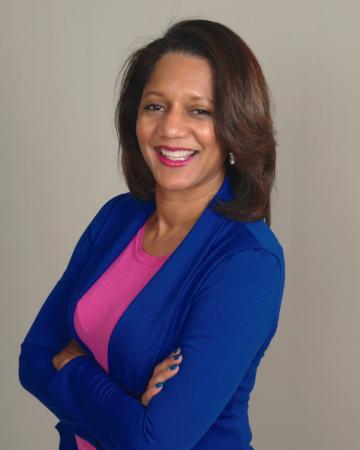Lisa Collins talks STEM education, her contribution to the Capital One Coders program, and her journey in the technology industry as a Black woman.
Science, technology, engineering, and math (STEM) studies are often portrayed as areas with high barriers of entry and low retention, especially for Black students. But Lisa Collins, director of data engineering at Capital One, does not subscribe to that worn-out stereotype. The Richmond, VA native believes her career passion now lies within the field of tech and data. She has served in many roles at Capital One over the last 15 years, but now she actively volunteers in her community with the Capital One Coders program finding ways to help spark young student’s passion for all things STEM.
AfroTech spoke with Collins to learn more about the Capital One Coders program and her role as a volunteer, mentor, and lead co-sponsor in the initiative to bring STEM into every classroom.
From an early age, Collins knew education would be the bedrock of her future. Surrounded by family support and her talent for technology and computer sciences, she took her first steps into the tech industry after graduating with her bachelor’s degree in computer information systems.
“My grandfather grew up very poor and education was extremely important to him, so it was always instilled in me that I was going to college,” Collins said. “He saved money for me to go to college in addition to my mother who saved money for me to go to college all of my life.”
Collins did not know she was meant to be in the tech field. She entered college with no major in mind, and instead decided to explore her options and find a major organically. After a semester of ease in her programming class, Collins realized she had a talent for tech. She received dual degrees, an MBA and a master’s degree in management of informational technology. Her internal guidance to the tech field paid off and as a result, led to her career at Capital One.
“I kind of stumbled into data after I got into tech and really enjoyed the things that I was learning from data,” Collins said. “I initially joined Capital One as a consultant and remember really being intrigued by the way they use data to create new products and create better support.”
Over the span of her 15-year career at Capital One, Collins has played an important role in the expansion of the company’s social responsibility agenda too. One mission of the company is to prepare people for the jobs of today and tomorrow, and her most recent venture to support this is through Capital One Coders.
“Talent is everywhere, but the opportunity isn’t, and I’ve had some opportunities and I want to make sure that others get opportunities as well,” Collins said.
The Capital One Coders program is a STEM-driven mentorship and educational program aimed at helping young students explore their interests in technology through design thinking and coding. It pairs Capital One associates like Collins with middle school students in local communities. Students are then guided through a 10-week program where they learn how to code and build their own apps. After the conclusion of the program, Capital One surprises the students with a Chromebook to continue pursuing their newfound interests in STEM.

After volunteering to be a mentor a few years prior, Collins realized the larger impact the program could have on participating students. Since its inception in 2014, the Coders program has entered 120 schools and helped 12,000 students. But Collins wanted to do more. The Coders program started to recruit from her community, from some of the very schools she once attended, and she wanted the chance to be a role model she didn’t have growing up.
“I wanted them to be able to see another African American in technology, doing what they are learning,” Collins said. “A lot of times kids are able to dream about things and feel confident that they can achieve something that they see other people doing.”
Collins branched out to take the Coders program to the next level. She partnered with Blacks in Technology, Capital One’s internal Business Resource Group focused on increasing representation of Black men and women in technology. With their help, Collins began to sponsor a 10-week program in conjunction with the Capital One Coders based out the Richmond Boys and Girls Club.
“Not only does this program teach them about technology from a career perspective and what coding is and lets them know that it is possible for them to do it, but also purely gives them more opportunity in front of a computer,” Collins said.
Collin’s initiative is a multi-layered approach designed to shrink the opportunity gap between low-income and affluent students by providing students with access to basic technology training. The co-sponsorship generated a new wave of Black tech professionals to go back into their communities and be the inspiration and guidance for more Black kids to enter the tech industry.
“It is a great opportunity to have a whole chapter of Blacks in Technology go into our inner city,” Collins said. “To see professionals that are doing things they may aspire to be. This is a great opportunity for us to give them that exposure.”
Collins understands the importance of representation more than anyone. Too often in her professional career she has been the sole Black woman specializing in data and tech. It was through opportunities in organizations like Black Tech Women where she was able to surround herself with a circle of people who looked like her. In these types of representing groups, Collins was able to leverage her identity and the privileges of her opportunities to help lift a new generation of Black coders and tech professionals.
“A lot of the limitations and self-doubt are self-inflicted, and I have often limited myself in my career growth and using my voice,” Collins said. “Recognizing that and listening to myself more and telling myself a different story about what’s going to help me do better and move forward in my career [is important].”
Collins hopes to further expand this new initiative and push more Black students into the tech field. She hopes to find more partners like Blacks in Technology and help communities outside of Richmond. She stumbled into her career in tech, but Collins is working toward a future where students will have a clear path into the field. With the resources and access of the Coders program and Collin’s initiative, young students everywhere can further explore and cultivate their interests in tech and help make STEM a more diverse field.
“Most people who code don’t get it right the first time,” Collins said. “Mistakes are part of the process, it’s how you learn and how you grow, you have to keep going and don’t stop. It’s really a parallel to your life — don’t be afraid to try and keep trying.”
This piece is brought to you in partnership with Capital One.


